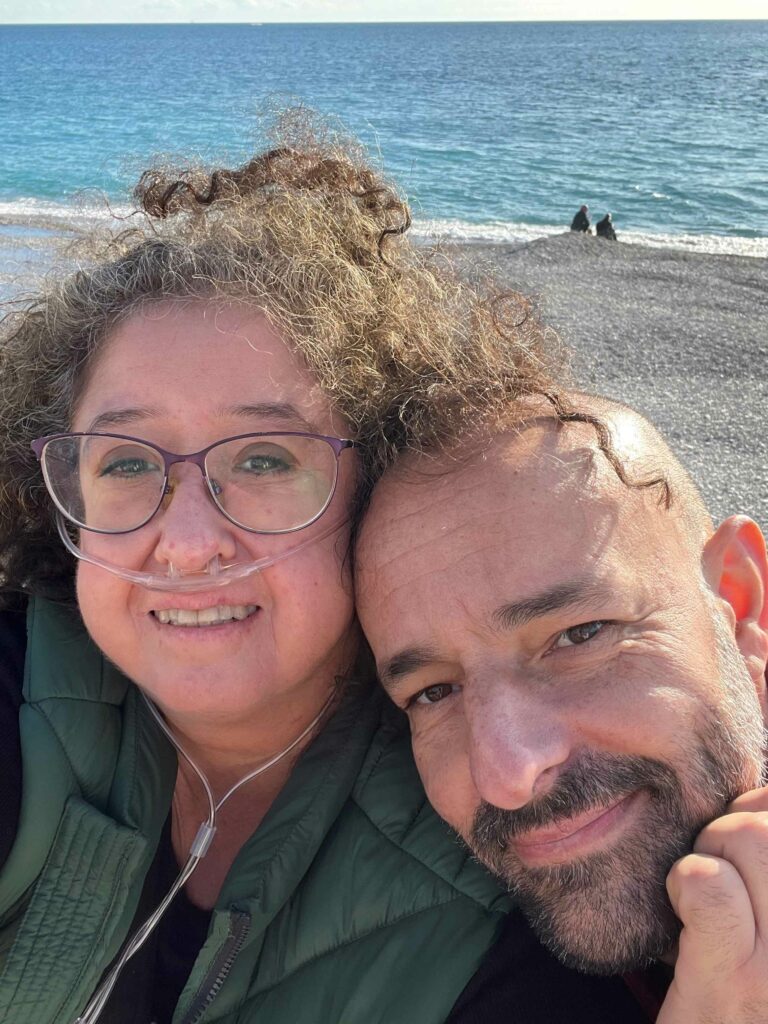Pulmonary fibrosis
This information is for people with pulmonary fibrosis and their carers (caregivers). It provides information, support and resources about living with pulmonary fibrosis.
Content Table
Pulmonary fibrosis: a supportive guide
Read our supportive guide, created by patients for patients. The guide has been translated into 17 languages with support from the European Pulmonary Fibrosis Federation.
See all available translations of 'Pulmonary fibrosis: a supportive guide'
The European Lung Foundation (ELF) Pulmonary Fibrosis – Patient Advisory Group (PF-PAG) put this information together with the help of experts in the field of pulmonary fibrosis and a selection of patient organisations.
What is pulmonary fibrosis?
Pulmonary fibrosis (PF) is a relatively uncommon lung disease. It gets worse over time and does not go away once you have it. It can impact different areas of your life and may prevent you from doing some activities. The word pulmonary refers to the lungs and fibrosis means scarring.
Pulmonary fibrosis is one of the main types of interstitial lung disease (ILD), which affect the soft tissue of the lungs. All conditions in this group cause scarring and swelling in the lungs. Idiopathic Pulmonary Fibrosis (IPF) is the most common form of interstitial lung disease. Idiopathic means that the cause is not known. The other most common types are:
- Non-specific interstitial pneumonia
- Fibrotic hypersensitivity pneumonitis
- Rheumatoid arthritis – ILD
- Scleroderma – ILD
- Asbestosis and silicosis
- Fibrotic sarcoidosis
- Unclassifiable ILD
In lungs affected by PF, the soft, spongy tissue is taken over with thick, scarred tissue¹. This makes it hard for the lungs to expand when breathing in. Also, the fibrosis stops the normal movement of oxygen from the lungs into the bloodstream, which makes you feel more breathless.
Diagnosis
It is important to diagnose PF early so treatment can start as soon as possible but it can be hard to diagnose. Medical experts will investigate with a CT (computed tomography) scan of the lungs as well as lung function testing, bronchoalveolar lavage (a saline solution put through a bronchoscope to wash the airways and collect a sample from the lungs for testing), blood tests or a biopsy. Once they have ruled out other conditions, they can diagnose PF.
When visiting your family doctor they may listen to your chest using a stethoscope. One of the signs of PF is a sound known as “Velcro Crackles” which will be picked up by the stethoscope. Another sign of PF can be finger clubbing, when the end of one or more fingers is enlarged.
Symptoms of PF include:
- breathlessness
- fatigue,
- persistent cough.
It is important to discuss these symptoms with your family and doctor/respiratory consultant to select the most appropriate way to manage them.
You can use the symptom tracker (found in the downloadable resources below) to help monitor your symptoms.
Many people find cough to be a frustrating symptom but there are some ways to help you manage this. For example, lozenges menthol, honey and lemon, ice-cream. Some medicines can help make your phlegm less thick and help you cough it up. There are also medicines that can reduce the need to cough: codine linctus, morphine patch and liquid morphine.
You may experience a sudden flare-up (exacerbation) of PF – this is when your condition gets worse often due to frequent lung infections. If your condition suddenly gets much worse, you should get urgent medical treatment – this is called an acute flare-up (exacerbation).
Causes
Pulmonary fibrosis is caused by a combination of exposure to harmful materials and genetic predisposition.
It can be caused in the following ways, but is not limited to these:
- Breathing in harmful materials such as metal, stone, and wood dusts.
- Breathing in dust or air containing bacteria and other allergens from sources such as bird droppings
- Medical conditions which affect the joints, such as arthritis, the muscles and the skin.
- Familial – meaning it is passed down from a parent.
- Drugs such as nitrofuratoin or some chemotherapies can cause fibrosis in some people.
Sometimes, the cause is not known as in idiopathic pulmonary fibrosis (IPF).
Life expectancy
Life expectancy varies from person to person and it depends on many factors such as: age, treatment and the stage of the disease.
You may see some reports that people diagnosed with PF can average 3-7 years survival after their diagnosis. However, that can be misleading as some of the information is out of date.
There are now treatments available to slow down the progression of the PF. How long someone will live after they are diagnosed will vary from person to person.
Getting the most from your hospital appointments
To make the most of your hospital appointments consider the following:
- Prepare questions to ask at the appointment in advance.
- Bring someone with you.
- Take notes.
- Make sure you fully understand what is said to you. If you do not understand, ask the doctor to clarify and to repeat it in non-medical terms.
- Ask about how your pulmonary fibrosis is likely to progress.
- Confirm who to contact after the appointment about exacerbations or other queries.
- Ask what you should do in an emergency? For example, an acute exacerbation.
Provide as much information as possible to your healthcare team, such as:
- Any previous surgeries or treatments.
- Food or drug allergies.
- Health conditions that run in your family.
- Any lifestyle changes or habits that may be relevant to your health condition.
Make a note of any physical changes you or friends and family have noticed so you can tell the doctor about them.
If you have a telephone or video consultation be aware that your doctor may not be able to see any physical changes to your appearance such as:
- Lip colour which may appear more blue due to your condition.
- Weight loss.
- Finger thickness which may change due to swelling.
You can read ELF information on remote care for more information on video consultations and online appointments.
The personal medical health form below can help you keep track of your personal and medical information and can be useful to take to your appointments so that you have it to hand.
Psychological support and mental wellbeing
Looking after your mental health is just as important as your physical health. Having a lung condition can be stressful. For example, breathlessness is common to most people with PF. The feeling of breathlessness can lead to anxiety, low mood, negative thoughts and anger or frustration.
Having a multidisciplinary and an interdisciplinary team (respiratory specialists, family doctors, specialist nurses, physiotherapists, dieticians and psychologists) plays an important part in meeting such needs. Unfortunately, such patient-centred approaches are not sufficiently available throughout Europe at present.
Good mental health means that you are more likely to be taking care of yourself and managing your treatment well. If you are experiencing poor mental wellbeing, you may be less interested in the things you previously enjoyed. You may feel more anxious, tense, or have difficulty coping with the stress of living with PF. The challenges of living with PF can be quite difficult, so you need to look after yourself and your mental wellbeing. It can also be challenging for carers, so the suggestions outlined below may also apply to them.
Remember, “it is okay to be not okay”.
If you feel that you are not coping well it is important to have a discussion with a healthcare professional before your mental or physical symptoms worsen.
If feelings of anxiety or depression continue for a prolonged period, it is important to get help. You or your carer may notice daily sadness or low mood, difficulty sleeping, lack of appetite and loss of interest in hobbies and interests, these can also be signs of mental ill health. You should speak to your doctor, they will connect you with a mental health professional who can offer therapy and medical support. You may find a support group will help you cope.
Here are five self-help ways to improve your mental health and well-being:
Support groups and patient organisations
Support groups and patient organisations provide helpful support for your emotional and mental wellbeing. They can also provide reliable information to patients and carers. Patients and carers may find support groups an uplifting experience. Through the shared experience of PF, they may feel less isolated. Patient groups provide empathy and friendship, for example, in support group meetings, webinars, online information days or sessions, phone helplines and the use of a variety of social media for their members.
Access a list of PF patient association members of EU-PFF .
Treatment, medication and monitoring
Medicines
There are two drugs currently available which can slow progression of the disease and may extend the length of someone’s life with PF. These are Nintedanib (Ofev) and Pirfenidone (Esbriet). The criteria to receive these drugs varies between countries. Your doctor will be able to tell you about the options in your country.
Vaccinations
It is important to stay up to date with your vaccinations as people with PF tend to suffer from respiratory infections. You should speak to your doctor about regular flu, pneumococcal and COVID-19 vaccinations. Record dates of jabs so you know when you are due to have a booster vaccine.
Pulmonary rehabilitation
Pulmonary rehabilitation is a programme that aims to reduce the physical and emotional impacts a long-term lung condition can have on a person’s life. It combines exercise training with education about ways you can help keep yourself as healthy as possible.
Pulmonary rehabilitation is both physically and mentally beneficial. The sessions will be tailored for people with PF and the specialist running the class will know how to progress you gradually and safely. Pulmonary rehabilitation usually involves attending at least two exercise sessions a week. The sessions consist of aerobic and resistance training and exercises to improve balance and flexibility.
It is best to be referred to pulmonary rehabilitation as soon as possible after being diagnosed with PF. Your consultant should be able to refer you to a rehabilitation programme.
The key benefits of pulmonary rehabilitation include³:
- Improved physical strength
- Improved symptoms such as fatigue and breathlessness
- The opportunity to meet and interact with others in similar situations
- Improved quality of life
- Reduction in tension and anxiety
- Education about how best to look after your condition
Oxygen therapy
This treatment may be offered to you if the level of oxygen in your blood is low when you are resting or if your oxygen levels drop too much when you are active. The oxygen treatment will help you to breathe more easily. You might only need to use oxygen when you are doing physical activity or you may need to use it all the time, it depends on how advanced your PF is.
Singing for lung health
Singing for lung health can be one way of helping you to live better with PF. It can have both physical and mental health benefits.
Singing for Lung Health (SLH) programmes focus on the learning techniques around breathing control and posture that are considered necessary to sing effectively. Singing helps to strengthen the muscles that the human body uses to breathe. It means that you can learn to breathe more deeply and slower than before. As a result of the strengthening of these muscles, it helps to control your breathing. It also helps to strengthen your voice.
The main benefits of Singing for Lung Health are⁴:
- It improves breathing control and distracts from
- Improves social participation and reduces feelings of
- It provides tools for self-management of posture, breath and
- Participants find it fun and an enjoyable form of
- It is a high value intervention and the delivery of it is low
Lung transplant
The only treatment that can cure PF is a lung transplant. All other treatments are only aimed at slowing down the progression of the disease.
If you are otherwise healthy, you may be suitable for a lung transplant. This is an operation where one or both lungs are replaced. Double lung transplants have a better overall survival and long-term outcome, but many patients do well with single lung transplants.
Not everyone will qualify for a lung transplant. There are a lot of different things to consider. There are also not enough organ donors. This means all countries have a waiting list to receive a lung transplant.
The best way to increase the availability of donor organs is to promote organ donation to people around you. The more people who are willing to donate, the shorter the waiting lists. In some countries there are age restrictions for receiving a lung transplant. Those over 65 years may not be eligible. It is important to check what criteria are in place in the country where you would have the transplant. There may be reasons why lung transplant is not suitable.
Lung function tests
Lung function tests (often called pulmonary function tests) are very important because they measure how well the lungs are doing. There are a variety of tests to measure different aspects of lung health. The tests help to track how your condition is progressing. This varies from person to person, so the lung function tests enable the healthcare team to monitor and best manage your condition.
Find out more about spirometry tests.
Find out more about gas transfer tests.
Make sure to ask a member of your healthcare team to explain to you what the results of your lung function tests mean.
The six-minute walk test
The six- minute walk test (6MWT) is a relatively straight forward test. It measures how far you can walk in 6 minutes. Both your heart rate and oxygen levels are monitored during the test. This is done to see how well you can tolerate physical activity. The results of the test can show if your condition is getting worse and if you may need oxygen or additional oxygen.
Taking part in research
People with an illness or disease often take part in a type of research study called a clinical trial to help themselves and others.
A clinical trial measures how safe and effective a medical treatment will be for human use. The treatment may be a medication, a device, a procedure or an exercise programme.
You will not be signed up to a study without being given time to read information about it and to ask questions. Any risk associated with the study will be explained to you by the research team.
There are other types of research studies that you may also be able to take part in including:
- An observational trial where the aim is to learn more about the disease without testing any treatment.
- The design of new research, as a patient on a panel of people designing the
For more information and to find clinical trials see the EU-PFF clinical trial finder.
Palliative/supportive care
Supportive or palliative care is provided for people with life threatening illnesses and their families. It is ongoing support to meet any physical, mental health, social or other unmet needs. Its focus is on controlling symptoms, improving the person’s quality of life and supporting their carers. It can be offered from the time they are diagnosed to the end of their life. It can be provided in homes, hospitals, health centres and hospices.
There can be many types of healthcare professionals involved (and volunteers) to provide this care. It can be given alongside hospital-based treatment, and on an occasional basis when needed.
Every person’s needs are assessed to see if supportive or palliative care is the correct option for them. When the individual is extremely unwell, they or their family may decide the time has come to focus on comfort care only. This means treatment moves from trying to extend a person’s life to keeping them comfortable⁵.
Living well
Physical activity
It is very important for people with PF to stay active. Keeping fit will help you to feel less breathless and make daily tasks easier to complete. It will also help you to maintain muscle strength, including your breathing muscles.
If you are not currently active, slowly introducing exercise can be helpful to you. It is important to build up gradually. For example, if you are going for walks, start with what you can do and gradually build up the number of steps. Set achievable goals for yourself and aim to stick to them. Exercise can reduce fatigue and ease anxiety and depression. Breathing exercises can also help with your mental health and help you control breathlessness.
Avoid intense exercise if you are feeling unwell. It is important to pace yourself and allow recovery time between exercises. If you are on oxygen, use it as prescribed. Getting out of breath with exercise is normal but if you notice a sudden and extreme worsening of your symptoms or you do not see an improvement once you stop exercising, seek medical help immediately.
Healthy eating
Healthy eating is vital for good health. Adopting and maintaining healthy lifestyle habits and behaviours can improve your quality of life with PF.
Some people with pulmonary fibrosis find it difficult to eat a large meal. Eating small portions more often might be a better option. It is best not to wait until you are hungry to eat, aim to create a regular pattern. Take small bites and eat soft, moist food as it will make it easier to swallow. Aim to drink liquids at the end of your meal. Sit up while you eat as it eases pressure on your lungs.
Eating a healthy and balanced diet helps build a strong immune system and can help you maintain a healthy weight.
Being overweight adds to the effort of breathing because it is harder for your muscles to work – this can make you feel more breathless. Being underweight, can lead to muscle weakness, and makes it harder to breathe, this affects mobility and your ability to exercise. If you are concerned about your weight speak with your doctor about nutritional care such as working with a dietitian⁶.
Sexual health
Sex is an important human need like eating, exercising and sleeping. For some, changes in your sex life are just part of getting older and not because of your lung condition. Others, with PF may be fearful of sexual activity which causes increased breathlessness, which can get in the way of sex and relationships. However, this does not mean you cannot have sex. Although you may breathe more rapidly, and your heart and blood pressure might go up for a short while, this is normal, and they will return to regular levels within a short time. For more information on how to manage your breathlessness, talk to your doctor.
Travel advice
If you are planning air travel, you should discuss this with your doctor or consultant. Even if you are not on oxygen, air travel can affect your oxygen levels. The duration of air travel can be an important factor, as long flights can have a bigger impact on your oxygen levels.
If you are on oxygen, check with your doctor about your oxygen needs. Also, check with your oxygen supplier. You may need to have a “fit to fly” or “hypoxic challenge” test. This will show if you need additional oxygen when you fly and is different from the COVID-19 fit to fly test. Should you need additional oxygen to fly, the airline will ask you for a medical certificate. They may also have other requirements so you should contact the airline well in advance of your flight.
Airports can be big and you may need to walk long distances. You can request special assistance both at the local and destination airports. This can help you to arrive at your destination more relaxed. You will need to give the airport advance notice of your needs. Some require 48 hours advance notice, but it is best to check with the airline you are travelling with.
Find out more about travelling with a lung condition.
Air quality and lung health
Air quality is important to everyone, but especially people with PF. Air pollution can cause you to experience worse symptoms. To reduce risks from air pollution, check the local air quality or sign up to a pollution alert service. Avoid exercising outdoors when the air pollution levels are high. See your doctor should your symptoms persist or worsen.
Indoor air pollution can cause difficulties for people with PF (especially those with severe PF) as they tend to spend more time indoors, so it is necessary to reduce this risk as much as possible.
A mask may be a helpful tool to help protect your lungs when you are not able to avoid areas of high air pollution (use a type of mask suited to the situation).
Further resources
-
Patient associations
-
Sexual health
-
Mental wellbeing
Pulmonary Fibrosis and Mental Health – A Roadmap for Coping Webinar
Mental wellbeing and lung health
Minding Your Wellbeing/Session 2: Understanding Our Thoughts
Minding Your Wellbeing Session 3: Exploring Emotions
HSE Living well programme, HSE Health and Wellbeing
-
Mindfulness
NHS 24/ An Introduction to Mindfulness
Mindfulness: Finding Peace in a Frantic World – Mindfulness Body Scan
-
Exercise
ILFA Exercise Video, Irish Lung Fibrosis Association
ILFA Yoga DVD for Lung Fibrosis, Irish Lung Fibrosis Association
Tai Chi with Niall – Bolton Age UK
Lung Foundation Australia: Exercise and Pulmonary Fibrosis
-
Pulmonary rehabilitation
-
Singing for Lung Health
-
Telemedicine – phone and video consultations
-
Air Quality
-
Travel
Downloadable tools
-
References
1 Irish Lung Fibrosis Association, Information Leaflet – What is Pulmonary Fibrosis? (https://Ilfa.ie/wp-content/uploads/2021/07/What_is_PF-1pdf)
2 NEF (the New Economics Foundation), Five Ways to Wellbeing Report (https://neweconomics.org/uploads/files/five-ways-to-wellbeing-1.pdf)
3 ERS Monograph on Pulmonary Rehabilitation, Authors Harrison Samanta; Teeside University, School of Health and Life Sciences, Powell, Pippa; European Lung Foundation, Lahham, Aroub; Monash University Central Clinical School, (Edited by Anne E. Holland, Simone Dal Corso and Martin A. Spruit.) ERS Educational Publications, (15th March 2021)
4 Lewis, A., Cave, P., Stern, M. et al. Singing for Lung Health – a systemic review of the literature and consensus statement. npj Prim Care Resp Med 26, 16080 (2016, p5).
5 Irish Lung Fibrosis Association, ILFA Patient Information Day, presentation by Maria Love (Senior Medica Social Work Practitioner, Mater Misericordiae University Hospital,) on the subject of: “The Psychological Aspects of Living with IPF,” (6th February 2019)
6 Irish Lung Fibrosis Association, ILFA Patient Information Day, presentation by Patricia Whyte Jones, (Clinical Nurse Specialist, St. Vincent’s Hospital, Dublin) on the subject of: “Living Well with Pulmonary Fibrosis,” 17th November, 2021










